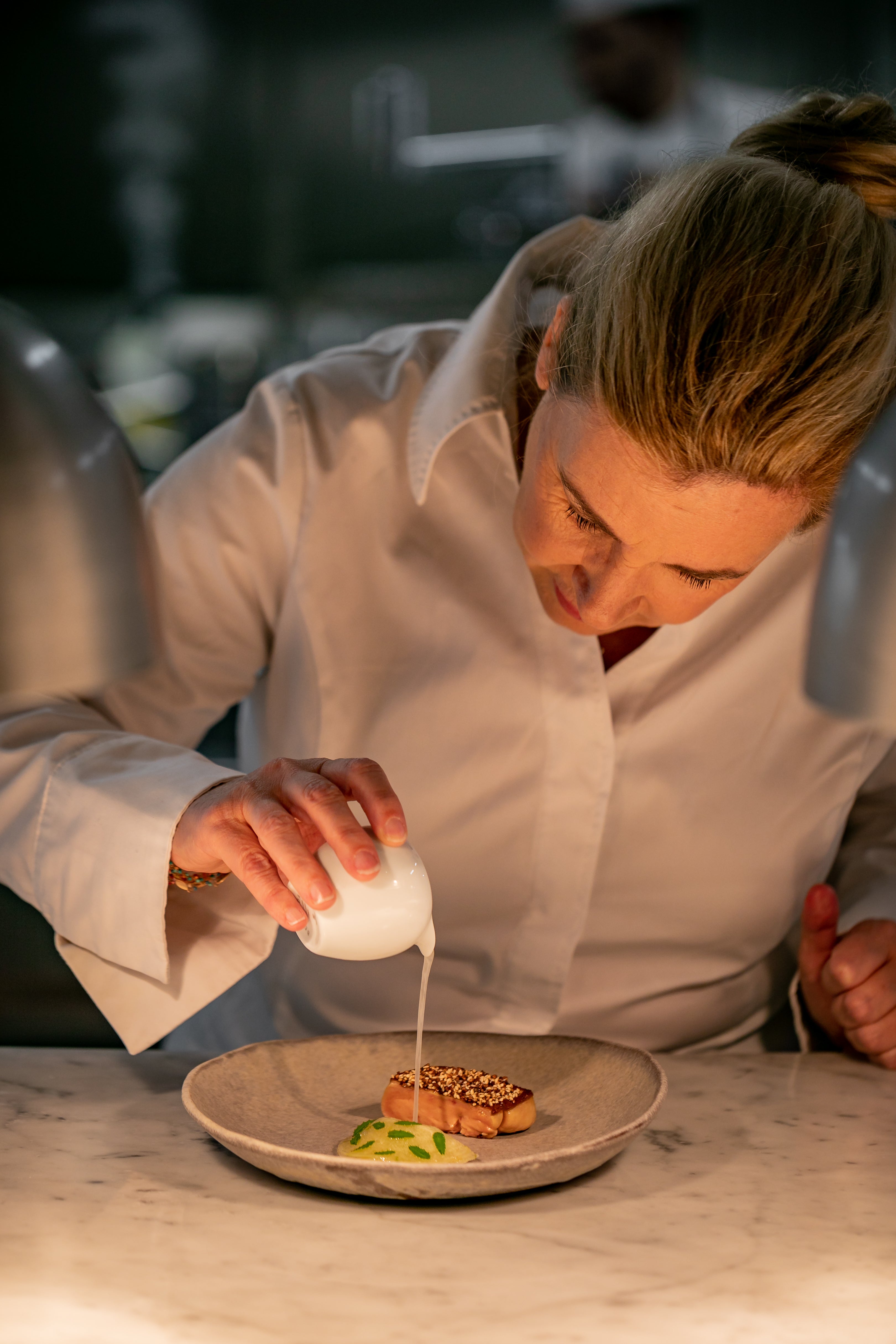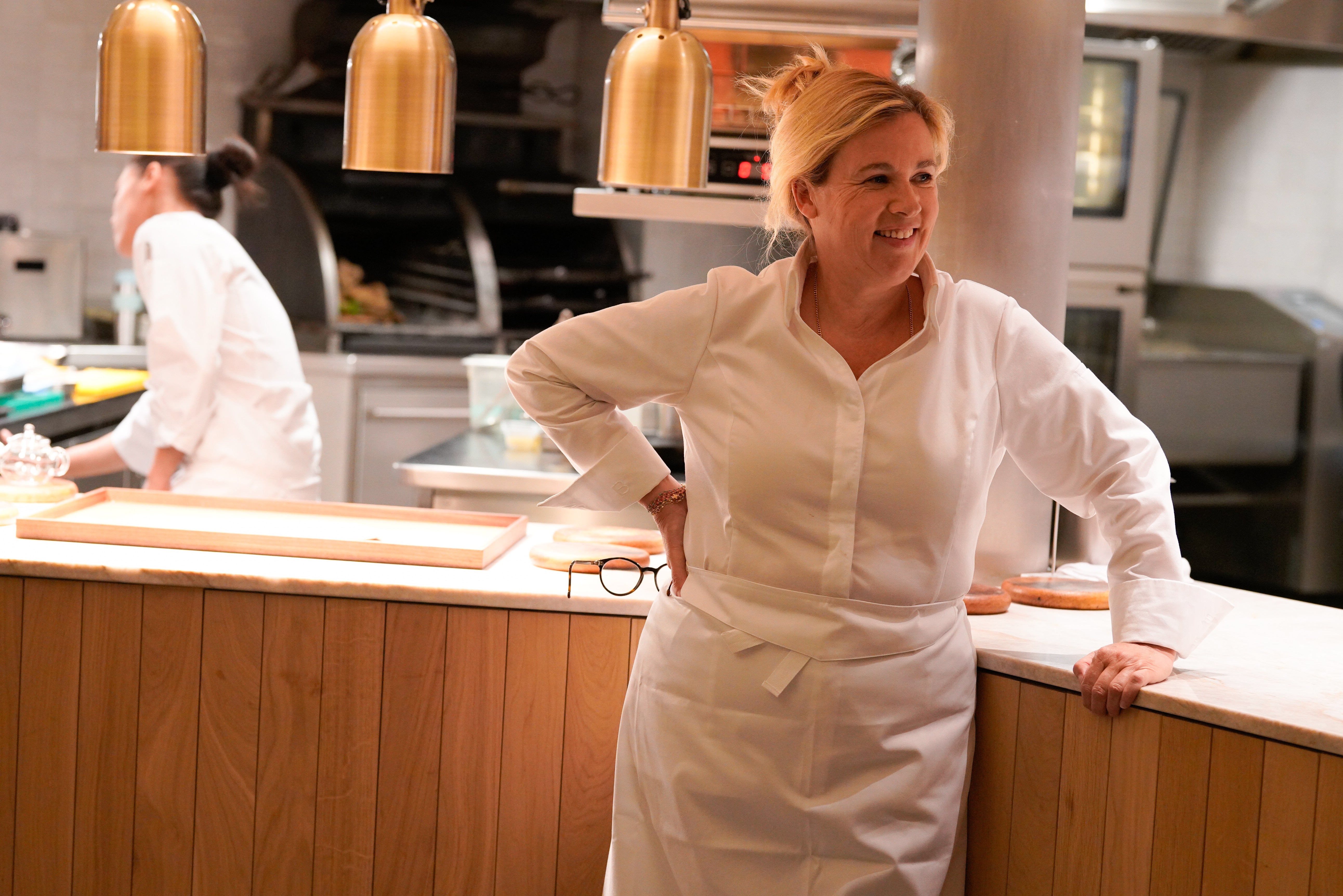Hélène Darroze: ‘I never tried to be anything other than a woman’
The French chef is one of just a handful of women to be awarded three Michelin stars. She talks to Molly Codyre about navigating the male-dominated world of food, using her gender as an opportunity and the strength that can come from femininity


On 25 January 2021, Hélène Darroze became part of a small, lauded group of chefs to have been awarded three Michelin stars. She joined just a handful of women to have achieved something that, to many, is seen as the peak of culinary success. “It was like a dream,” Darroze tells me “But I don’t even know if I’d allowed myself to have that dream because it was so massive. I have to admit, when I got that third star, it was the most emotional moment of my professional life.”
It seemed like a career in hospitality was always a given for Darroze “I was born in this industry. I was born in a kitchen. I was born in a pan.” She talks about growing up in her family restaurant and how this Michelin-starred spot in the South of France made a job in food almost inevitable. After graduating from university, she worked with Alain Ducasse at Le Louis XV restaurant in Monaco (she still cites Ducasse as an enormous inspiration for her), where she remained for three years, before heading back to her family restaurant to help it retain its Michelin star. It wasn’t long before she opened her eponymous restaurant in Paris, which earned Darroze her first star in 2001. Two decades later, Darroze has three restaurants in Paris, London (at The Connaught), and Provence, three Michelin stars and two daughters, who she describes as the best part of her life.

Darroze rose to culinary fame around the turn of the millennium, at a time when the hyper-macho chef persona was at its peak. Chefs were finding worldwide notability and building entire characters off the back of aggressive, expletive-laden masculinity that didn’t seem to offer direct space for women or femininity. “While today there aren’t many women in food, I can tell you that 20 years ago I was nearly alone in Paris,” Darroze tells me. “I always took the fact that I was a woman as an opportunity. I always tell this story – when I was about 32 and had two Michelin stars, I opened Paris and got the second star fairly quickly. There were articles in the newspapers and everywhere and I realised that the other chefs at the two-star or three-star restaurants, weren’t being talked about. They were talking about me, because I was a woman. So I took this as an opportunity, it was a chance to be different.” She says. While Darroze is overwhelmingly positive about her experience as a pioneering female chef, she does admit that this has perhaps been because she has consistently worked at a calibre that is impossible to pick holes in: “If the cuisine and my way of working and what I deliver to the restaurant wasn’t at the level at that time, if I made any extra mistakes, I can tell you that some people would have taken this opportunity to try and cut me down, for sure.”
Speaking to Darroze, however, it is unsurprising that she never would have allowed someone the chance. This is a woman who has risen to the absolute peak of the culinary profession, despite all the odds, and seems to have done so while serving as the direct antithesis of her peers. “For sure this industry is male-dominated, and for sure I am one of the few women within it,” Darroze tells me. “My daughter would be very upset with me if she could hear me, but women and men don’t have the same sensibilities. We don’t have the same reaction. I never tried to be anything other than a woman – and I think that meant that I managed my people with a bit more generosity and humility.”
Darroze goes on to highlight that this extends to how she cooks as well. “My emotions are very different from men, and I think male chefs, when they’re cooking, they want to demonstrate something, it’s about technique before emotions; they want to prove that they’re at a particular level. Whereas women, and myself in particular, I want to give a bit of myself, I want to give an emotion, I want to speak about myself on the plate.”
Humility is a key theme throughout our conversation; both because Darroze seems to possess bucketloads of it, and also because it is evidently a quality she hugely admires – never more so than when discussing her immense gratitude for her team. “In a week I'm going to have lunch with 12 key people in my team, who I know are loyal. They’re passionate like me, I know that they understand and embrace my philosophy, I know that they will continue to work by my side for a long time. They have this humility and this passion to give happiness.”
Darroze adds that aside from winning her third Michelin star this year, building such a reliable, motivated team is probably the pinnacle of her career so far.

Michelin stars are of course not the only accolades Darroze has been given over her glowing career. In 2015 she was named Best Female Chef at the World’s 50 Best awards. I asked if she had an opinion on the fact that this award was in its own category – separate from the “World’s Best Chef”, which a woman is yet to win. “Yes, I have an opinion,” says Darroze “Once again, I took it as an opportunity. I hope that one day a female will be the best chef in the world, regardless of gender. I can’t see it happening soon because there are so few female chefs, but I hope it will come.” She then adds, “I saw winning this award as an opportunity to inspire other women.” There is a pragmatism to Darroze’s responses. I get the impression she is very aware of the gender gap within the food industry – having undoubtedly lived it – and chooses to see it as a problem that she can hopefully help to change, rather than a direct obstacle to her day to day life or success.
Instead of attempting to emulate her male counterparts, Darroze has spent her career leaning into her femininity, and using it to her advantage. She brings a sense of peace and an emotional element to her kitchen and subsequently her food. During service, she runs a tight, silent ship. There is none of the yelling or aggression people have come to associate with high-paced, Michelin-starred kitchens. Instead, there is a space where Darroze is referred to by her first name – rather than the commonly used “Chef” – and a strong understanding that there can be power in humility, and strength in womanhood.
Join our commenting forum
Join thought-provoking conversations, follow other Independent readers and see their replies
Comments
Bookmark popover
Removed from bookmarks